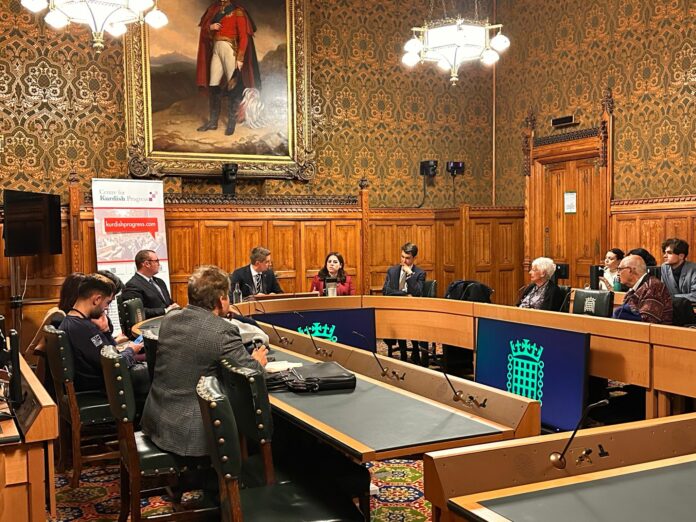Tackling misinformation: The role of traditional media outlets in countering fake news during times of crisis
House of Commons – Committee Room 8
19:00, Tuesday, 7th November 2023
Speakers: Matthew Offord MP, Leo Keay, Thomas Clowes-Pritchard.
Chair: Dr Ruwayda Mustafah
Tackling misinformation: The role of traditional media outlets in countering fake news during times of crisis
House of Commons – Committee Room 8
19:00, Tuesday, 7th November 2023
Speakers: Dr Ruwayda Mustafah, Leo Keay, Thomas Clowes-Pritchard.
Chair: Jack Gebhard
On Tuesday, November 7th, a roundtable discussion was held on Tackling misinformation hosted by Jack Gebhard. The event explored the role of traditional media outlets in countering fake news during times of crisis.
Dr. Ruwayda Mustafah addressed a panel, emphasizing the pervasive issue of disinformation in Iraq Kurdistan, distinguishing it from misinformation. In a landscape where political entities control various media outlets, distinguishing truth from distortion becomes challenging. Despite the initial belief that traditional media had become obsolete with the rise of social media, the prevalence of fake news on platforms like Twitter and Facebook has led people back to traditional sources. She highlighted the Rudaw, grappling with the complexity of disinformation, initiated a pilot project to verify viral content, attempting to counter the spread of falsehoods.
The lack of accountability on social networking platforms compounds the problem, as anonymous accounts disseminate fake news without repercussions. The language barrier further hampers efforts, with community news on Twitter primarily catering to English speakers. Dr. Mustafah highlighted the challenge of combating fake news, asserting that sensational and controversial stories gain rapid traction, while substantive and verifiable news is perceived as mundane. To address this, she advocated for supporting media platforms closer to the truth and fostering citizen-led journalism, particularly in conflict-prone regions in the Middle East. Despite Rudaw’s efforts to play a positive role, the dominance of political entities in Iraq’s media landscape remains a significant obstacle, unlike countries such as the UK, where legislation supports journalistic integrity.
Leo Keay delved into the intricacies of disinformation, contemplating its strategic deployment amid recent developments in the Middle East. Referencing Winston Churchill’s wartime wisdom on truth guarded by a “bodyguard of lies,” Keay explored the psychological operation inherent in warfare. He emphasized the influence of planted narratives on how security policy actors decide and react, expressing particular interest in their real-world consequences. The example of the Gaza hospital bombing illustrated the tangible impact of misinformation, leading to the cancellation of a summit and further conflict escalation. Keay underscored the importance of caution, verified reporting, diverse perspectives, and contextual analysis in navigating the expanding media landscape and combating the vulnerability of societies to exploitation.
Thomas Clowes-Pritchard raised crucial questions about discerning truth and trust in the 21st century, expressing scepticism even towards organisations like NGOs and the United Nations. Clowes-Pritchard emphasised the importance of patience, asserting that the truth will eventually emerge. He scrutinised media outlets, including social networks like Twitter, Facebook, and TikTok, noting their unregulated nature and the potential for misinformation. Referring to John O’Sullivan, he mentioned the term “malinformation” to encompass both misinformation and disinformation. Clowes-Pritchard cautioned against blindly accepting narratives and stressed the need to distinguish between true and false information, especially when governments are involved.
In summary, the discussions revolved around the intricacies of disinformation, examining its strategic use in conflicts and the resulting psychological impact. Instances were cited where narratives, initially attributed to one party, were later debunked. The broader scepticism extended to various institutions, emphasizing the prevalence of misinformation and the challenges in discerning truth. The unregulated nature of social networks and the potential for false facts were noted. The term “malinformation” was introduced to encompass the spectrum of misleading information. Overall, the emphasis lay on patience, discernment, and critical evaluation amid a complex and dynamic media landscape.

